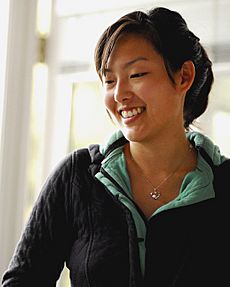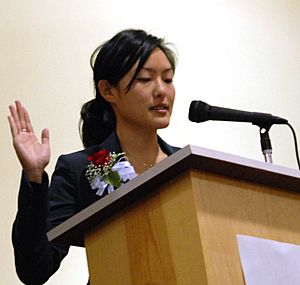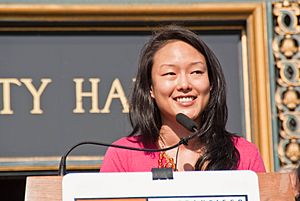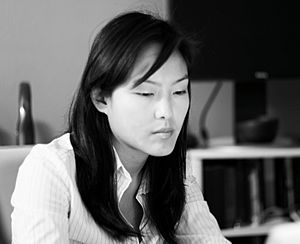Jane Kim facts for kids
Quick facts for kids
Jane Kim
|
|
|---|---|
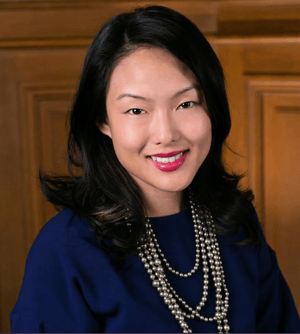
Official portrait, 2014
|
|
| Member of the San Francisco Board of Supervisors from the 6th district |
|
| In office January 8, 2011 – January 8, 2019 |
|
| Preceded by | Chris Daly |
| Succeeded by | Matt Haney |
| Personal details | |
| Born |
Jane Jungyon Kim
July 9, 1977 New York City, New York, U.S. |
| Political party | Democratic (2008–present) Green (before 2008) |
| Other political affiliations |
Working Families (2022–present) |
| Domestic partner | Goodwin Liu |
| Education | Stanford University (BA) University of California, Berkeley (JD) |
| Signature | |
Jane Jungyon Kim (born July 9, 1977) is an American lawyer and politician. She was the first Korean American person to be elected to public office in San Francisco. From 2011 to 2019, she served on the San Francisco Board of Supervisors, representing District 6. This board helps run the city of San Francisco. She is also part of the San Francisco's Democratic County Central Committee. Currently, she is the executive director for the California Working Families Party.
Before joining the Board of Supervisors, Jane Kim was a member and then president of the San Francisco Board of Education. In 2016, she ran for a seat in the California State Senate but did not win. She also ran for mayor of San Francisco in 2018, finishing third.
She worked as a political director for Bernie Sanders' 2020 presidential campaign.
Contents
Early Life and Education
Jane Kim was born in Manhattan, New York, on July 9, 1977. Her parents came to the U.S. from Seoul, South Korea, in 1971.
Kim grew up speaking both English and Korean. Her mother owned a clothing store. Her father joined a global cosmetics company when she was in college. At age 14, Kim started learning taekwondo and eventually earned a black belt. She was active in community work, especially helping people experiencing homelessness. While attending Spence School, a prep school in New York, she stopped saying the Pledge of Allegiance. She felt that the words "with liberty and justice for all" were not true for everyone, especially for LGBT people.
Kim graduated from Stanford University with a bachelor's degree in Political Science and Asian American Studies. She then moved to San Francisco and studied at the UC Berkeley School of Law. She earned a law degree and became a lawyer in California in 2009.
Career Beginnings
After college, Kim worked as a Fellow at the Greenlining Institute in San Francisco. She then became a Youth Community Organizer at the Chinatown Community Development Center (CCDC). Even though she was not Chinese American and did not speak Chinese, she was hired because she impressed the interviewer. For six years, Kim successfully led a program for young volunteers and leaders in San Francisco Chinatown. Through this work, she met an important community leader named Rose Pak.
In 2005, Kim was elected president of the San Francisco People's Organization (SFPO). This group included many well-known San Francisco activists. SFPO worked on issues like health care and affordable housing for San Franciscans.
Serving on the San Francisco Board of Education
In 2003, while helping a Green Party candidate for mayor, Kim noticed that Asian Americans were not well represented in San Francisco politics. In 2004, she decided to run for the San Francisco Board of Education. She did not win that election. In 2006, Kim ran again and won, getting the most votes among 15 candidates. In 2007, she became the first Korean American person elected to public office in San Francisco.
In 2006, the school board discussed whether to continue the Junior Reserve Officers' Training Corps (JROTC) program in high schools. The board voted to stop the program over two years. Kim believed JROTC should not be in San Francisco schools as long as the U.S. military had a "don't ask, don't tell" policy. In 2008, Kim suggested an alternative program called Student Emergency Response Volunteers (SERV). This program would train students in emergency preparedness. However, the effort to remove or replace JROTC failed in 2009.
Kim changed her political party to the Democratic Party in 2008 after Barack Obama was elected president.
In 2010, she became president of the Board of Education. In this role, Kim had to manage state budget cuts that affected San Francisco schools. She started the first district-wide Restorative Justice Program. This program aimed to reduce the number of African American students being suspended or expelled. She also helped start ethnic studies classes in all San Francisco public high schools.
Becoming a San Francisco Supervisor
Kim lived in different parts of San Francisco before moving to District 6 in 2009. She then ran for the San Francisco Board of Supervisors to represent District 6. This district includes areas like Union Square, Tenderloin, and South of Market. Kim announced her plan to run in January 2010. She had support from former mayors Art Agnos and Willie Brown.
Kim won the election for supervisor, which was a surprise to many. When she was sworn in, she became the first Korean American supervisor in the entire country. She explained that without support from labor unions or the media, she used an "old-fashioned" strategy. She visited as many people in her district as possible. She received a lot of support from Chinese American residents, especially seniors in Chinatown, and from young people in San Francisco.
Pledge of Allegiance Stance
Kim stood during the Pledge of Allegiance at Board of Supervisors meetings but did not say the words. She had made this decision in her youth. She explained in 2011 that the words "liberty and justice for all" were not yet a reality for many people in the United States. This included communities of color, the LGBT community, immigrants, and women. Kim said she was dedicated to helping the nation achieve these ideals. On July 10, 2013, after a Supreme Court decision that helped LGBT rights, Kim recited the Pledge with the other supervisors. She said that the previous law had "symbolized the unfairness" of American justice for her.
Helping Businesses with Tax Breaks
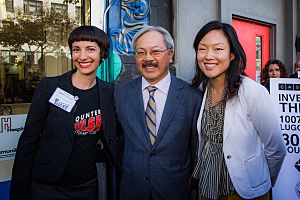
Twitter, a social media company, was located in District 6 when Kim became supervisor. In 2011, Twitter considered moving out of San Francisco because it needed more space. Mayor Ed Lee wanted Twitter to stay. Kim led a team to create a plan. She suggested a six-year tax break for Twitter if it moved to the mid-Market Street area of her district. This area was struggling economically. Kim's plan would apply to any large company willing to move there.
Some people thought this plan was a change from her usual focus on social issues. They felt it showed a more pro-business side. In April 2011, the Board of Supervisors approved the tax break plan. Two weeks later, Twitter signed a lease for a building in mid-Market. The Twitter tax break was a big topic in the 2011 San Francisco mayoral election. Mayor Lee supported it, and he won the election. By June 2012, Twitter had moved into its new location. Other tech companies also used this tax break plan.
Street Renaming Efforts
In March 2013, after a Polish leader made anti-gay comments, Kim announced she would try to rename San Francisco's Lech Walesa Street. This street was originally named Ivy Street. Kim suggested honoring Gay Games co-founder Tom Waddell instead. The San Francisco Board of Supervisors voted to change the name as Kim proposed.
Improving Bicycling Safety
Kim worked on several issues related to bicycles in San Francisco. While on the Board of Education, she supported new bike racks for schools. She also promoted Bike-to-School Day. In 2011, she rode as a passenger on a bike for Bike-to-Work Day, and in 2012, she rode her own bike to City Hall. Kim supported the Yerba Buena Street Life Plan, which included new bike paths and more bike parking. In 2013, she asked for a hearing to improve police procedures for investigating bike accidents. In 2014, Kim, along with other supervisors, called for the city to adopt a safety plan for bikes and pedestrians called Vision Zero. During her time as supervisor, Kim helped create 18.6 miles of protected bike lanes, more than any other supervisor.
Protecting Tenants from Evictions
In September 2016, Kim wrote a bill called "Evictions Protections 2.0." This bill aimed to protect renters from "no fault" evictions, which had been increasing. These evictions happened when landlords wanted to rent apartments at higher market prices. The bill stopped landlords from evicting tenants for small reasons, like leaving shoes in the hall or painting a bedroom. It also removed rules that limited roommates in apartments. The legislation was passed in October 2015.
Working for Affordable Housing
In April 2015, the San Francisco Giants baseball team and Mayor Lee proposed a large community development project called Mission Rock. This project needed voter approval. In May 2015, the Giants said that 33% of the project would be for affordable housing. Kim believed a larger portion should be affordable housing. She created her own plan to increase affordable housing. This led the Giants to negotiate with her. Kim and the Giants agreed to increase the project's affordable housing to 40%.
In 2021, Kim was involved in discussions about a new apartment complex near a BART station. She argued against it because it only offered a small percentage of affordable units for low-income residents. She stated she advocated against the project on her own time.
Making Community College Free
In April 2016, Kim suggested that tuition should be free at City College of San Francisco (CCSF). The college had lost many students and funding. Kim proposed a real estate tax to raise money for this idea. Voters approved her plan in November 2016. CCSF's accreditation was confirmed for seven more years in January 2017. The next month, Mayor Lee and Kim announced a deal. The city would pay $5.4 million per year to make tuition free for CCSF students who had lived in San Francisco for at least one year. The program, called Free City, also gave cash to low-income students to help with books, transportation, and other costs. This was the first time a U.S. city made community college tuition free for all its residents. When the program started in September 2017, enrollment at CCSF greatly increased. Bernie Sanders praised the program as a "model" for the country.
Other Elections
Kim ran for the 11th California State Senate District in 2016 against Scott Wiener. Kim received slightly more votes in the first election, but she was defeated by Wiener in the final election.
Kim was also a candidate in the 2018 San Francisco special mayoral election. This election happened after Mayor Lee passed away in December 2017. Kim was one of the top candidates. She received 24% of the vote, finishing in third place.
Personal Life and Media
Kim plays electric bass guitar and has performed with an all-female indie rock band called Strangely. She co-founded Locus Arts in San Francisco's Japantown in 2000. This was a non-profit gallery to support Asian American art. She also helped save Bindlestiff Studio, a place for Filipino arts. Kim sometimes judges poetry slam competitions.
Kim has been featured in magazines like 7x7, SF Weekly, and KoreAm. In 2012, she talked about her favorite drinks, including wine and single-malt whiskey.
In August 2016, it was reported that Kim was dating California Supreme Court Associate Justice Goodwin Liu.
 | Roy Wilkins |
 | John Lewis |
 | Linda Carol Brown |


